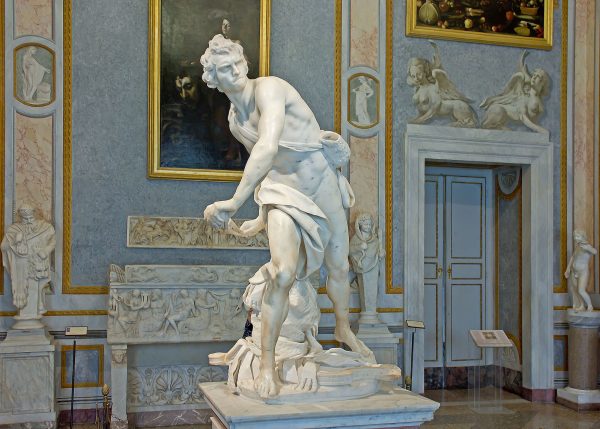A Preview of National Conservatism II
A New Normal?

The future of national conservatism.
As I came down to breakfast at the Hotel Nazionale in Rome on the morning of February 5, a headline on the front page of the New York Times caught my attention: “How the Far Right Became Europe’s New Normal.” I couldn’t help smiling at the irony. The paper surely meant to alarm its readers with the intimation that extremism, racism, fascism, and the various other noxious -isms that we have been taught to associate with the phrase “far right” were taking sinister control of Europe’s politics.
But if there was one thing that had surprised me about the previous day’s conference, entitled “God, Honor, Country: Ronald Reagan, John Paul II, and the Freedom of Nations,” it was how normal it felt, once again, to air the common-sense convictions that borders, culture, faith, biological sex, and history matter.
I knew and trusted the conference organizers, but I did come to Rome with a bit of trepidation, not knowing just what two-headed monsters or fire-breathing fascists I might meet. After all, one does hear such disturbing things in the media about all these European nationalists, now all assembled here under one banner from Italy, France, Spain, Hungary, Britain, the Netherlands, Poland, Sweden, and more.
Apparently, I wasn’t the only one. As Yoram Hazony (chairman of the Edmund Burke Foundation) told the enthusiastic audience of 300, so many of these co-belligerents, meeting one another for the first time, had remarked to him that they had been surprised and delighted to find each other so friendly and reasonable—“after all, you read such awful things in the papers about them.”
And sure enough, it didn’t take long before awful things were appearing in the papers about the “far-right gathering” in Rome. In the U.K., Tory M.P. Daniel Kawczynski, one of the speakers, was subjected to withering denunciations for participating in an event “alongside a number of people with reprehensible views.” The clear implication was that these reprehensible views included anti-Semitism, and U.K. Jewish groups demanded a public apology from Kawczynski.
Any reference to the content of Kawczynski’s remarks (or those of any other speaker) was notable only by its absence; mere guilt by association seemed sufficient.
If this was an anti-Semitic gathering, someone forgot to tell the Jewish members of the organizing committee, Yoram Hazony and Ofir Haivry. Indeed, French conservative leader Marion Maréchal, who has been accused of anti-Semitism because of her family connection with the Le Pens, was attacked by genuinely anti-Semitic groups for going “to study the Torah from Rabbi Hazony.
This international confederation of nationalists seemed ready to prove Yoram Hazony’s controversial thesis in The Virtue of Nationalism: that nationalism actually offers the prospect of more peace, more freedom, more cooperation, and more pluralism between different peoples than does liberal globalism.
A Humble Conservatism
The Dutch parliamentary leader Thierry Baudet put it even more emphatically in his talk, insisting that “nationalism equals peace.” Baudet could certainly be accused of overstating his case. As British journalist Douglas Murray (one of the keynote speakers) noted in his reflection on the conference, nationalism is certainly at least capable of fostering violence. Too much nationalism, or the wrong sort of nationalism, undeniably played some role in the brutal conflicts that engulfed Europe in the first half of the twentieth century. Against the backdrop of those conflicts, the attempt to tame nationalism through international institutions in the post-War years was no doubt well-intentioned.
But as Italy’s elder statesman Antonio Marino noted in the conference’s final session, institutions once designed to contain the runaway passions of national feeling have now so tightened their grip on Europe that they risk choking out any national sentiment and shackling the hands of any statesman concerned to defend the interests of his people.
Precisely since each nation is different, a new national conservatism will look different in each, a point that both Murray and Maréchal highlighted. A British national conservatism will be very different from a French, and a French quite different from a Hungarian.
Indeed, Hungarian Prime Minister Victor Orbán, whose interview had the room buzzing, offered a strikingly modest account of his political program. He was interested, he said, in a national conservatism that worked for Hungary, and did not pretend to offer it as a blueprint for larger Western European nations.
This, then, was Baudet’s point—a modest Dutch nationalist has no reason to begrudge the French nationalist his defense of French soil, language, and interests, just because they differ from the priorities of the Dutch. Nor need he eschew bilateral or multilateral cooperation with other nations, so long as they do not involve a forfeiture of sovereignty.
To be a national conservative is to be anti-ideological. The liberal project in recent decades has become uncompromisingly universalist, with vacuous and formalistic notions of individual freedom and procedural justice papering over an intolerant spirit of enforced outcomes and compliance.
The European Union is the political incarnation of this vision, determined to erase borders, history, national traditions, and the particularist bonds of loyalty that resist its imperialistic reach. No wonder, then, that nearly all the speakers at the event were united in opposition to the E.U. and its technocratic bureaucracy. Mentions of Brexit and its recent success were greeted with cheers and applause.
But, as Murray also admonished the attendees, national conservatives—precisely by virtue of being national conservatives—ought to resist universalizing Brexit as either some unstoppable wave of populism sweeping the globe, or as a blueprint that other European nations must follow. Hazony himself went perhaps as far as any of the speakers in suggesting that Brexit might be such a blueprint, and in calling for the representatives of various E.U. nations gathered there to purify themselves and go out from among this Babylon. But even he acknowledged that for each nation and each party, this must be a prudential question. Many speakers, therefore, advocated reform from within and a concerted push to repatriate powers of sovereignty that had somehow slipped away to Brussels.
Even amidst the sometimes intemperate denunciations of Angela Merkel, Emmanuel Macron, cultural Marxism, and the evil empire at Brussels, though, conference attendees were frequently reminded that national conservatism must not be a program of rage and reaction. The Honorable Giorgia Meloni, leader of the rapidly-growing Brothers of Italy Party, quoted J.R.R. Tolkien:
“I do not love the bright sword for its sharpness, nor the arrow for its swiftness, nor the warrior for his glory. I love only that which they defend.”
So speaks the character Faramir in The Two Towers, whom Tolkien sets up as a role model of authentic conservatism over against the chauvinistic bellicosity of his brother Boromir and the nihilistic reactionism of his father Denethor. Boromir represents what many people think of when they hear of “nationalism”: an arrogant confidence in his own nation’s exceptionalism and indispensability, and a willingness to sacrifice moral principles to help her maintain her glory and preeminence. Denethor, while sharing this myopia, combines it with a fierce determination to keep the wheel of history from turning, and to be crushed beneath it rather than admit error and adapt. When confronted with the inevitable change of the world that he had long known, he declares, “I would have things as they were in all the days of my life, and in the days of my longfathers before me…but if doom denies me this, then I will have naught: neither life diminished, nor love halved, nor honor abated,” before throwing himself onto a funeral pyre.
Both of these characters represent standing temptations to conservatism, and to today’s national conservatives in particular.
It is easy for us to feel like a desperate and embattled minority, and succumb to the temptations of reaction and xenophobia, fearful of anything new or anyone unfamiliar. In a scathing write-up in the Atlantic, journalist Anne Appelbaum claimed to hear in the talks “an almost paranoid sense of persecution.”
There were certainly a few crankier or more pessimistic speakers, as there are in every crowd. But this was far from the dominant tone of the event. Rather than xenophobia, Meloni called for a politics of oikophilia, as the late great Roger Scruton has called it. Such a politics, driven by love rather than fear, and humility rather than pride, is capable of a quiet confidence in the face of adversity, modelling the sort of “non-anxious presence” and “freedom from fear” that Polish scholar Michal Luczewski described in his reflection on the powerful witness of Pope John Paul II.
“The New Humanism of this Century”
Courage can come not merely from a dedication to defending what one loves, but from recognizing just how normal and common these objects of love are. National conservatives may have different priorities and perspectives given their different backgrounds, but, as Maréchal emphasized, that does not mean that they do not stand united in defense of a common reality:
We are the new humanism of this century. Why? Because we know and we defend all the needs of the human soul: Order, Freedom, Obedience, Responsibility, Hierarchy, Honour, Security…all these needs that are essential to the human being and that progressivism is refusing to satisfy. Without meeting these needs, there can be no civilization, no emancipation, no happiness.
We refuse relativism. We believe in natural law, in universal ethics. We think that individual will cannot be the only compass of society…. We represent realism while they represent ideology, we embody memory while they are amnesia, we belong to a historical continuity while they are focused on the next IPO or the next election.
The dominant portrait of national conservatives today is of petty and spiteful tribes, stubbornly attached to their own narrow slice of reality and unwilling to adapt to change or share with newcomers.
And too often, this portrait is not far from the truth. Nationalist movements can certainly tend to attract the angry, the disgruntled, and the narrow-minded; racism is a genuine force among some European nationalist groups. But Maréchal rededicated national conservatism to the preservation of what it means to be human, against the dehumanizing “commodification of man and his products” and “the anthropological revolution” that ends, as C.S. Lewis saw 75 years ago, in the abolition of man.
Where must nationalists begin in their defense of human nature? Well, where human life begins, of course: in the womb and in the family. Some spoke of the evils of abortion, others of the trade in sperm donations and surrogate wombs, many of the collapse in birth rates and crumbling of the natural family, the building block of society, where children learn that rights and duties are inseparable.
Human beings enter the world with duties that we did not choose, norms that are not ours to remake, boundaries that cannot be transgressed without harm to our common humanity.
Chief among the inheritances to which Europeans and Americans must be faithful, suggested several speakers, was the Christian faith. We must also remember that in Europe at least the defense of the historical nation must be the defense of the Christian nation—that, as Meloni quoted John Paul II, “there is no Europe without Christianity.”Orbán likewise explained his political program as one of “Christian democracy,” with the preservation of the nation’s Christian heritage as an irreducible component of its identity and its moral vision.
In honouring John Paul II and Ronald Reagan, the participants looked back on a time when the nationalist and conservative causes had been anchored to a fading but still broadly shared Christian vision. Was that still possible in Europe today, where a militant secularism was increasingly elevated to official orthodoxy? The speakers did not all seem agreed on this point.
Most did agree on the necessity of recovering a moral and social framework that would offer a proper perspective on freedom, that great political ideal. Political freedom cannot mean giving oneself over to the bondage of individual desire, and economic freedom must not subject the citizenry to the tyranny of the market. Many of those present echoed familiar conservative themes about fiscal restraint, reducing the size of the state, and recognizing the blessings of the market, but they rejected the dogmatic neoliberalism that hijacked much of conservative politics after the end of the Cold War. Markets, it was stressed, were made to serve people—and nations—not the other way around.
The Necessity of Borders
National conservatism does insist on a moral minimum for good government. Where it parts ways from the pompous moralism of elites, however, is in its recognition that each person’s universal humanity is only lived, and only protected, in a particular community.
“Global problems,” Maréchal declared, “seldom have global solutions.” Even climate change shows “we do not protect what we do not know:” you can rally a nation to the defence of its own farms and rivers, its own children and grandchildren, but precious few people will ever be moved to sacrifice by a love of abstract humanity. A world without borders will be a world without meaning and without accountability.
This concern brings us to the fraught question of immigration, the point on which Europe’s “far Right” is most routinely denounced for its racism and xenophobia. Europe’s leaders and media have united in seeking to enforce a ban of silence on any discussion of Islam or the migration crisis, and to ostracize anyone who dares to break this taboo.
This strategy, however, risks becoming a self-fulfilling prophecy: if concerned citizens are allowed no legitimate outlets to voice their fears, they will choose illegitimate ones instead. Inability to discuss Europe’s blatant failures to assimilate its massive and restless immigrant communities all but guarantees radicalization and extremism, among both the immigrant communities and their host peoples.
When this question was broached at the conference (which was surprisingly little, in fact), it was largely in tones of hospitality, not hostility. Immigrants, remarked Francesco Giubelei (leader of an Italian conservative think tank and a conference co-organizer), were welcome to become part of Italy, but one cannot become part of something without accepting its norms and traditions—in this case, norms and traditions anchored in Christianity.
Of course, Europe can hardly blame immigrants for failing to assimilate, observed Thierry Baudet, when it has become so unsure of itself that it has given them nothing to assimilate to. The biggest piece of the migration puzzle, it seemed, was not a matter of refusing to let people join Europe’s nations, but of again making Europe’s nations into realities worth joining. Without a demos (which cannot exist without borders), it is idle to talk of democracy.
This decay of democracy was the loudest theme, the greatest source of indignation, at the conference. A continent that once prided itself on democracy now regularly calls for new elections whenever a people is bold enough to actually speak against the fashionable consensus or to demand more popular sovereignty. A continent that exported the rule of law to the rest of the world can no longer abide that rule itself, but prefers domination by judges, as Belgian legal scholar Matthias Storme and Polish MEP Ryzsard Legutko observed.
In much of Europe, democracy has given way to oligarchy, and an oligarchy astonishingly out of touch with the needs, interests, and values of its constituents. People act, said Murray, like the idea of sovereignty is somehow too obscure or abstract for the ordinary person to understand. Not at all. Sovereignty means the power to choose one’s leaders, and just as importantly, the power to get rid of them. More than anything else, Brexit happened because it slowly dawned on the British people that when they asked the technocrats at Brussels, “how do I get rid of you?” they were met with silence and a smirk.
To all appearances, Communism had been dealt a mortal wound on that day 30 years ago when the Berlin Wall fell. But, many of the speakers cautioned, the stubborn spirit of Communism had taken up a new home in the ascendant liberal progressivism that succeeded it. This progressivism, now tightening its grip on public discourse and demonizing all opposition, has begun to bear all the hallmarks of totalitarianism, American journalist Rod Dreher warned in one of the opening talks. Again the world is witnessing the same alienation of individuals from society, the same loss of faith in established institutions, the same ideological thinking and politicization of everything that allowed Communism to seize and retain control of half of Europe last century.
The new totalitarianism, to be sure, will be different from the old. It will be a totalitarianism, Dreher suggested, in which Western citizens surrender power in order to maximize pleasure, and stigmatize dissent in order to escape the burden of thought.
The Great Alternative
How can we resist these threats? Three answers stood out among those offered by this diverse coalition of European conservatives: remember, give thanks, and have the courage to tell the truth.
In every age, freedom has depended upon the power of memory, the recognition that all people belong to something older than themselves, and that the fashionable orthodoxies today presented as the only option for rational people were in fact born yesterday and may be gone tomorrow. Lose knowledge of history, observed Polish ambassador Anna Maria Anders, and you permit your enemies to distort history to their own ends.
With memory should come gratitude. To be sure: the past that we must remember, the nations that gave us birth, are stained with grievous sins. There can be no doubting this. The nationalist who tries to whitewash these is as shameful as the progressive who denies the reality of nations.
But we must not let the memory of past evil paralyze us in the present, or blind us to the genuine and extraordinary gifts that our Western civilizations have bequeathed to us. More than one speaker during the conference invited the audience to look up, to admire the extraordinary embossed ceiling of Rome’s historic Grand Hotel Plaza, with its frescoes and its arches—just one small monument to the beauty which adorned every street in central Rome. Each nation represented at that gathering had its own store of wisdom and culture, its own rich gift to future generations, which must be gratefully received and fiercely defended.
Finally, we must have the courage to speak the truth about this history and this culture, the courage to speak the truth about the problems that now face us.
If hatred is a great sin, so is self-hatred, which conservatives are routinely called upon to indulge. “We must,” declared Yoram Hazony, before receiving a standing ovation, “start disbelieving in the lies that are told about us.” It will not do to live in such fear of being thought an extremist that we cannot speak up about uncomfortable realities, or to stand shoulder-to-shoulder with potential allies.
The new national conservative coalition certainly has the wind at its back, but that does not mean it will all be smooth sailing. There really is a “far Right” in Europe, ready to channel bitterness against the progressive establishment into programs of violence, hatred, and authoritarianism.
The question is why. Even under the pressures of enforced European integration, austerity policies, and out-of-control immigration, most Europeans retain a sense of decency, civility, moderation, love for freedom, and hatred of violence, and most national conservative parties have succeeded in keeping extremists at arm’s length.
But if the European elites continue to pursue a course of denying, diluting, and destroying their national cultures, uglier and more radical elements may gain a larger hearing. Responsible national conservatives must continue to champion a politics based on oikophilia rather than xenophobia, and never be willing to compromise their commitment to open elections and free institutions.
The task of national conservatives in the years to come must be to prove them wrong: to model peace and cooperation in place of violence, to radiate confidence rather than fear, to display patience and humility in response to opposition. In short, we must love neither the bright sword nor the polemical pen for their sharpness, but only that which they defend—our faith, our families, and our homelands.
The American Mind presents a range of perspectives. Views are writers’ own and do not necessarily represent those of The Claremont Institute.
The American Mind is a publication of the Claremont Institute, a non-profit 501(c)(3) organization, dedicated to restoring the principles of the American Founding to their rightful, preeminent authority in our national life. Interested in supporting our work? Gifts to the Claremont Institute are tax-deductible.
Those who speak plainly about our regime’s decay are not the ones responsible for it.
Embrace the youth or continue to lose.
Even the strongest-held principles about big government will not dissolve it.
Patriot Front may not technically be staffed by FBI agents, but the effect is the same.
Liberalism will not go quietly.






